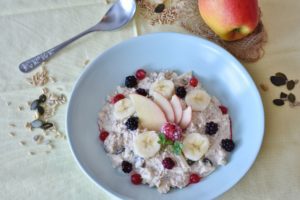Eating a healthy diet is important at any age, but your needs change as you get older. Your metabolism slows as you age, so you won’t need as many calories. But you’ll need to ensure that you’re getting the right vitamins and minerals to support your health and keep you active. Use these tips to stay in tip-top shape, no matter your age.
Table of Contents
Eat a Variety of Foods
The more variety in your diet, the more nutrients you’re getting. Mix things up to keep mealtime exciting and ensure that you’re getting the vitamins and minerals you need as you age.
Pay Attention to Food Groups
Your variety of foods should come from each food group to ensure adequate nutrient intake. That includes fruits, vegetables, lean protein, low-fat dairy, and whole grains.
Watch Your Serving Size
You need fewer calories as you age, so your portion sizes should be smaller after age 60. Don’t eat until you’re stuffed, but make sure your appetite is satisfied to help maintain a healthy weight.
Stay Hydrated
Not only can this keep you from overeating, but it supports good health. The sensation of thirst is reduced as you get older, so staying on top of liquid intake is vital to prevent dehydration. Water and milk are good choices.
Cut Back on Salt
People of all ages should watch their salt intake, but it becomes increasingly important as you age. Too much sodium is linked to higher blood pressure, increasing your heart disease risk. Keep your daily intake under 2,300 milligrams.
Eat Less Sugar
Sugar contributes to weight gain and certain health problems, such as diabetes. Because your metabolism slows in the later years, your sugar intake should be lower than it might have been when you were younger. Cut back slowly, so you don’t feel deprived.
Eat Healthy Fat
Your aging body still needs some fat to function and stay healthy. The trick is to choose the healthy kind that comes from olive oil, nuts, seeds, and avocados. Avoid the bad fats in fried foods, processed meats, and baked goods.
Eliminate Empty Calories
Empty calories come from foods like crisps, soda, candy, and packaged pastries. These foods are high in calories but don’t contain many nutrients, so they should be limited to have room for eating healthy foods.
Read Food Labels
If you’ve never paid attention to food labels before, now is the time to start. Reading the packaging on your food helps you determine what vitamins and minerals it contains, calorie content, and other information about how it fits into a healthy diet. Fresh, whole foods don’t contain a label and are usually your best option.
Get Some Help
Making dietary changes as you age can be overwhelming. Many programs can help you by offering advice and teaching you how to make the right choices. Somerset care homes are equipped to assist you with creating the ideal diet plan for your health needs. You can also talk to your doctor about taking probiotic supplements to aid your healthy diet. Choose the ones that offer many benefits, including improving digestion and supporting urinary tract health.
Taking care of your body ensures healthy aging and improves your quality of life by keeping you active and happy. It’s never too late to get started.
Featured Photo by CDC on Unsplash




